Graham Reid | | 7 min read
Jack Bruce: Waiting on a Word (from Somethin Els, 1992)

Talk to Jack Bruce and the of name of
That Band just cannot be avoided. Yet this Band That Dare Not Speak
Its Name occupied a mere three years in the life of this 51-year-old
musical polymath - and that ending as far back as ’69. Then he took
his phenomenal bass playing skills and distinctive, strong tenor
voice into a series of jazz-fusion projects (most notably into
Lifetime with drummer Tony Williams, guitarist John McLaughlin and
organist Larry Young).
In the past two plus decades Bruce has appeared alongside jazz composer Carla Bley (his most spectacular appearance was on her 1972 magnum opus Escalator Over the Hill), with avant-jazzer Kip Hanrahan and has skirmished with hard rock again in the company of grunt 'n' grind guitarists Leslie West (in West, Bruce, Laing) and Robin Trower (in BLT).
He appeared in a couple of stage plays
(he played the alcoholic author Malcolm Lowry in Bley’s adaptation
of the writer’s Under the Volcano) and has sprung nearly a dozen
solo albums, most recently celebrating his own 50th birthday last
year with a week-long reunion of old friends on a tour and subsequent
double disc, Cities of the Heart.
Quite a career - and quite some
friends: on Cities of the Heart, they included keyboardist Bernie
Worrell, drummer Simon Phillips, the grand old saxman of British
jazz-blues Dick Heckstall-Smith, guitarist Gary Moore and drummer
Ginger Baker. And it is with those last two names that the alarm
bells ring and That Band comes up.
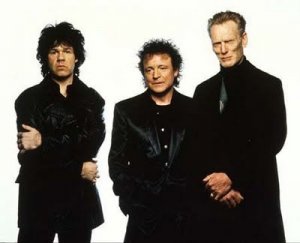 Because Bruce, Baker and Moore have
formed themselves into an old-fashioned power trio, BBM, which openly
acknowledges its debt to That Band in which Baker and Bruce were
members . . . the legendary, short-lived, hugely influential Cream.
Because Bruce, Baker and Moore have
formed themselves into an old-fashioned power trio, BBM, which openly
acknowledges its debt to That Band in which Baker and Bruce were
members . . . the legendary, short-lived, hugely influential Cream.
When Cream split in ’69, one of the
finest, most psychedelic and musicianly bands of the period was gone:
Baker off to Africa, eventually Italy and falling in with the world
music philanderers like Bill Laswell; Bruce off into that colourful,
mostly jazzist career; and guitarist Eric Clapton off into drugs,
Layla, bellbottom blues and all the famous rest.
BBM were obviously asking for trouble
by not only recreating a similar line-up but also openly courting and
rewriting some of Cream's finest aural signatures. Bruce, cheerful
despite a filthy cold and a plague of business meetings, admits they
“fully expected mean-spirited reviews.”
And despite rumours that they have
already fallen out since the release of their BBM debut, Around the
Next Dream, Bruce says he and Moore were in the studio as recently as
last week working on material for a second album.
And as for those reviews -- which, to
be fair, just had to point up the similarities -- they are more
manifest than the differences between BBM and Cream -- he simply says
people take rock music too seriously. That personal epiphany that
40-year-old reviewers got from Cream in their adolescence is there in
BBM if they want to hear it.
“What it’s about is there -- which
is some good playing plus exciting gigs, which is what I always
thought this was supposed to be about," he laughs.
And Bruce simply notes that these are
different times from those heady (if not head) days of the late
Sixties. That isn't factored in by reviewers, nor is any notion that
Bruce has quite often readdressed his past.
Reviewers of BBM are hardly likely to
have heard, for example, his solo album A Question of Time of four
years ago where “Obsession was basically Sunshine of Your Love
upside down and Life on Earth, if you analyse it musically, is [Cream's] White Room.” Oh, and Ginger Baker played on that album,
too.
“When I first started playing, I
liked that jazz style of people moving around and not just being in
one band. Even people who have spent a long time in [jazz] bands have
done different thing. I’ve enjoyed that and would never have been
happy being in one musical line-up all my life.
“Rock is into that image thing which
is so strong – so that’s what we are up against. It was a very
conscious decision to walk away from Cream when I did and I don’t
regret it because I have had some great musical experiences. And I'm
still alive!"
And still doing interesting things. His
Cities of the Heart album was a kind of Bruce live retrospective
which touched Creamy spots and solo material, and last year’s
excellent Somethin Els stretched from typically delicious Bruce
ballads (co-written with longtime pal Pete Brown and plastered with
licks from another old friend, the now not-so-reckless Eric) to
Satie-like pieces. Both show an artist in firm control of his various
muses.
Those albums, largely unheard in the
rock circles that rushed into print when BBM raised its Creamy head,
could have changed the public mindset about this likeable Scotsman
and father of five who once did rock, then seemingly disappeared into
jazz and elsewhere.
“I think that could have been true,
although it wasn’t deliberate. I just wanted to get a lot of old
mates together for Cities of the Heart and have a great time, and
that’s what we did.
"If I look back for particularly
rewarding experiences, I’d have to say Lifetime was a definite high
spot. It was fantastic to play with those people, a real joy
musically, although l guess it was a little ahead of its time and we
didn’t get the recognition we could have. To have been recognised a
bit more would have been better. Working with Carla was good, too,
but Lifetime stands out.”
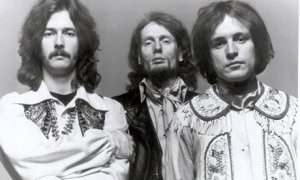 Curiously, given the 20/20 vision of
hindsight, the proto-fusion of Lifetime sounds remarkably like the
freewheeling improvising sound of Cream transposed into a jazz
context.
Curiously, given the 20/20 vision of
hindsight, the proto-fusion of Lifetime sounds remarkably like the
freewheeling improvising sound of Cream transposed into a jazz
context.
At the time -- the early Seventies --
rock audiences were tuning in to the trickle-down of Cream (Leslie
West's outfit Mountain, Led Zeppelin, Bachman Turner Overdrive) so
Lifetime, tagged with the jazz label, were over-looked.
It is understandable that the intuitive
interplay between the rock-conscious jazz players of Lifetime stands
out for Bruce; that kind of musical telepathy is rare. And he still
has it with Baker and Clapton, he says.
“I find that there are people I can
have some intuitive musical understanding with. [Jazz pianist] Don
Pullen and myself have something very special in the improvisational
thing. And Ginger?
“I’ve been working on and off --
more off, actually – with him since 1962, so what can you say about
that? I know what he's going to play before he does, and vice-versa.
I can't really think of too many disadvantages of that actually.
“And Eric? I played with him early
last year and that was amazing because it felt like we'd never
stopped. When you've done something like Cream. Which was very
intense, you never lose it or forget it.
“I've got mixed feelings about Cream
ending when it did. There were opportunities lost but I'm happy it
ended when it did. I got to do other things.”
Among them those acting spots which he
says were today were very hard work and undertaken for the challenge
of finding out if he could do them: “I haven't been asked again!”
"I also went through a stage of
trying to leave my past behind. When I first started my own band I
wouldn’t play anything from my past, but those thing go in cycles
and now I'm much more comfortable with it. And why not? I'm not
ashamed of those things.
“I did all those solo records which
were like diaries of who I thought I was at the time; they weren’t
meant to be commercial records or anything but were simply always
trying to be fresh and not related to the past.
“I even still like a couple of them!
Harmony Row stands out; it's kind of bleak but pleasant.”
And of albums by those he has worked
with over the years? Does he check them just out of curiosity?
“I should, but like a lot of
musicians I tend to get very isolated, so I’m a bit guilty of not
hearing those things. I keep myself busy -- I’ve got to with all
the kids I’ve got! But I heard some of those thing that Ginger did
with Bill Laswell. I thought they were pleasant.”
And Eric’s new one, the all-blues
From the Cradle, on which he -- like you – seems to have come full
circle?
“Umm. I’m sure it’s nice. I must
rush out and buy it," he laughs, sounding like a man very
comfortable with his past and his BBM present that is so full of it.
Cream will, as they say, always rise to
the top.


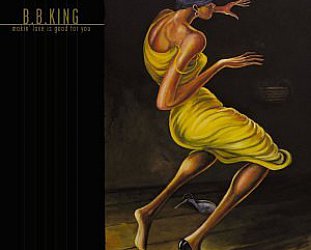
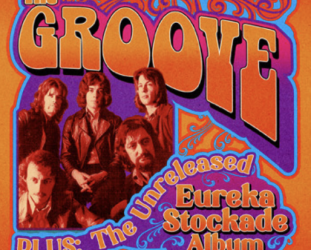

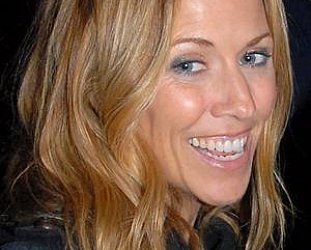
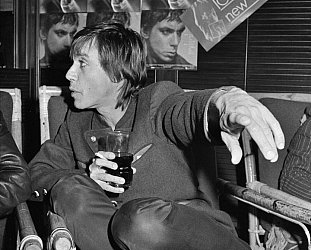
Rosco - Oct 27, 2014
71 has to count as a good innings. The story is here: https://www.youtube.com/watch?v=UZF1HrWKi68 But the legend lives on...
Savepost a comment